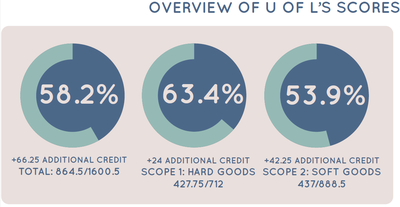UofL scores well in Post-Landfill Action Network's Zero Waste Atlas report
 In November 2020, after conducting a comprehensive Zero Waste Atlas Assessment designed to help campuses assess and streamline campus systems for materials management, the Post-Landfill Action Network (PLAN) gave UofL an overall Zero Waste score of 58.2% (864.5 out of a total possible 1600.5 points).
In November 2020, after conducting a comprehensive Zero Waste Atlas Assessment designed to help campuses assess and streamline campus systems for materials management, the Post-Landfill Action Network (PLAN) gave UofL an overall Zero Waste score of 58.2% (864.5 out of a total possible 1600.5 points).
This compares very favorably to the other campuses PLAN works with, which average between 40-50%.
For Scope 1 surplus property and hard-to-recycle materials, UofL scored a 63.4% (427.75 + 24 additional credits out of a total possible 712 points).
For Scope 2 food waste and single-use materials, UofL scored a 53.9% (437 +42.25 additional credits out of a total possible 888.5 points).
This assessment was conducted with the help of UofL's Zero Waste interns and laid the groundwork for the development of UofL's first Zero Waste Plan, which the Sustainability Council will begin to work on in 2021.

Read the full PLAN Atals Stage 1 Report here.
In Spring 2020, the Sustainability Council hired PLAN to support two UofL Zero Waste interns - Lily Stewart ‘22 and Jacob Foushee ‘22 - to conduct a holistic assessment of the University’s waste management system. UofL has expressed commitment to not only increasing their waste diversion rate, but also changing the ways the campus purchases and manages goods to be in the best interests of the environment and the University. The final report is intended to identify concrete steps that UofL can take to shift towards a zero waste system and continue to uphold its reputation as a leader among sustainably-minded universities.
The interns used PLAN’s Zero Waste Atlas Assessment - a project designed to help campuses assess and streamline campus systems for materials management - to collect the information used to inform this report. This report offers a snapshot of existing programs, services and infrastructure, illustrates ideal material flows throughout a campus, and proposes recommendations to fill the gaps identified during the assessment. While this Atlas Assessment provides numerous suggestions based on its assessment of the capacity of existing campus systems and best practices from other campuses, campus stakeholders must ultimately decide on the exact path the University takes to achieve zero waste.



